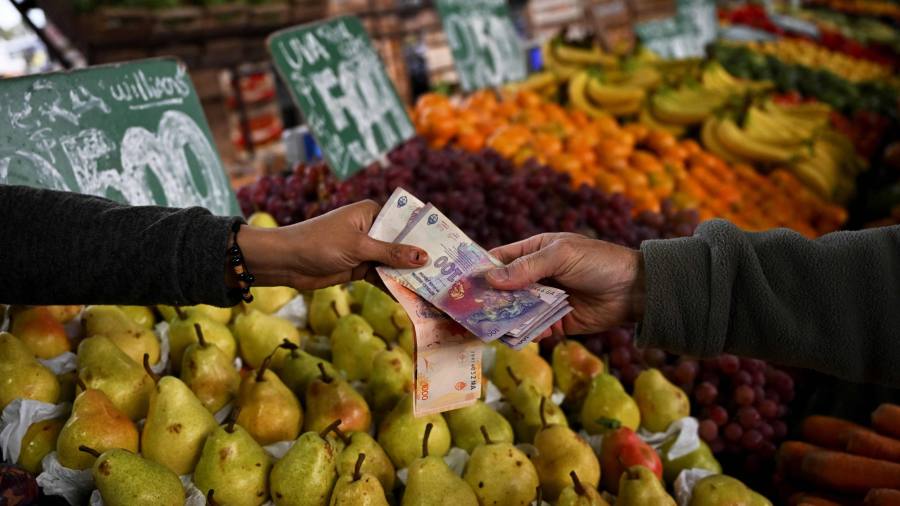Argentina will announce on Monday a new round of emergency government measures, including raising interest rates 600 basis points to 97 per cent, to try to stave off the country’s worst economic crisis in two decades.
The Peronist government is desperate to avoid a big devaluation before elections in October. But the South American country is also running out of foreign exchange reserves as Argentines abandon the fast-devaluing peso and embrace the US dollar.
Fuelled by money-printing to finance a large government deficit, Argentine inflation hit 109 per cent a year in April, the highest level since 1991. The economy ministry said the new measures, to be announced Monday, would involve the central bank stepping up intervention in the foreign exchange market to try to slow the peso’s fall.
Economy minister Sergio Massa is also trying to persuade the IMF to bring forward the disbursement of agreed loans and will travel to China on May 29 to seek greater use of the renminbi in foreign trade. Last month, Argentina activated a currency swap with China allowing it to pay just over $1bn of its imports this month in renminbi.
The IMF has already shown leniency towards Argentina over the past year, allowing it greater leeway on targets to increase reserves and reduce money-printing in an attempt to keep a $44bn loan programme on track. It is unlikely to want to bring forward disbursements in the months before a potentially pivotal election, which the government is likely to lose.
Massa also plans to allow the import of food at a zero tariff to try to bring down inflation, a first in a country which is one of the world’s largest grain exporters. The government will also lower interest rates on a state-run scheme for Argentines to buy locally made products on credit, part of an effort to boost national industry.
The latest package of measures does not represent a change of course, more an attempt to reiterate policies of heavy state intervention which have failed to bring down inflation or boost the economy. It also entails risks: constant rises in interest rates are making the servicing of a huge pile of domestic debt increasingly expensive.
“This is just kicking the can a few inches down the road,” said Hector Torres, a former IMF executive director and Argentine diplomat who is now at the Canadian think-tank CIGI.
“I have nothing against central banks using reserves to smooth volatility and fight speculators. But we are already out of reserves, deeply indebted to the IMF, with no access to capital markets. In that situation selling what we owe to the IMF to buttress an exchange rate that is clearly unsustainable is reckless. It can only invite speculators to bet on a new default.”
Economists have criticised the government’s foreign exchange and price controls for creating huge distortions, deterring investment and depressing production. Many forecasters expect Argentina to enter recession this year, with Oxford Economics forecasting a 1.6 per cent fall in GDP, the worst outlook for any major Latin American economy.
Amid a bitter squabble over policy between president Alberto Fernández and his powerful vice-president Cristina Fernández de Kirchner, Massa is seen as one of the Peronist movement’s few remaining options as a presidential candidate for October’s elections.
However, his plan to try to patch up the economy with temporary interventions to avoid painful austerity measures before the election has run into increasing difficulties, compounded by a severe drought which has hurt agricultural exports. Massa’s chances as a candidate now depend on the success of his economic plan over the next few months.
The centre-right opposition has yet to agree on a presidential candidate this year, with support divided between Horacio Rodríguez Larreta, the centrist mayor of Buenos Aires, and conservative law-and-order candidate Patricia Bullrich.
A far-right contender, Javier Milei, has been rising rapidly in the polls and could yet reach a second round run-off if he can increase his support beyond greater Buenos Aires. Milei has campaigned on a radical anti-establishment platform which includes abolishing the central bank and dollarising the economy.
Read the full article here




